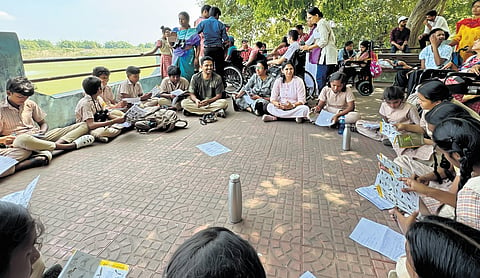

CHENNAI: On Thursday, a group of Class 8 students from the government’s Chennai Middle School in Gandhigramam were taken to Vedanthangal Bird Sanctuary in Chengalpattu. For these young boys and girls, it was a first visit outside Chennai!
There was a sense of enthusiasm, curiosity and zeal among the children, some of whom reached school as early as 6.30 am even though the bus was scheduled to leave by 7.30 am. TNIE was on the bus with the children and it was not an usual school excursion.
These students were part of the first cohort of 153 students from Chennai Corporation schools undergoing nature-based learning, a slight deviation from the traditional classroom learning. As part of a first-of-its-kind study in India, the Tamil Nadu government is trying to quantify how much nature-based learning can contribute to cognitive and critical-thinking skills, thereby improving students’ academic performance.
Chennai-based Palluyir Trust, which specialises in nature education and research, is heading the project that started from August last year. A team of nature educators visit these five schools every week and carry out activities either within the school or in nearby parks.
This is within the framework of the climate literacy programme launched by Chief Minister M K Stalin as part of Tamil Nadu Climate Change Mission. For instance, at Vedanthangal Bird Sanctuary, the students were given binoculars, a bird guidebook and an activity sheet. They were encouraged to identify the birds, observe their behaviour and frame sentences.
At the end of day, a group discussion was held and each student was asked to list out the birds on their checklist and talk about it. Sharanya Ari, Deputy Commissioner (Education), Greater Chennai Corporation (GCC), joined the visit on Thursday and interacted with the children. Sharanya told TNIE the results so far have been encouraging and GCC was thinking about adding more schools in the next academic year.
“The students are liking the programme and seeing fun in learning. Nature is a great teacher. It develops critical thinking, curiosity and interpersonal skills.” Palluyir Trust founder Yuvan Aves, the brain behind the programme, said there is definite improvement in children, which is endorsed by their class teachers.
“This study will give us important insights into the applicability of nature and climate literacy and its many benefits, especially to vulnerable communities. Its findings could also inform the state’s future education policy.” He said the benefits of nature-based learning, especially for the urban working class and socio-economically backward in the Indian context, have never been studied.
Similarly, the importance of nearby wild and accessible wild spaces like parks, marshlands, and grasslands in children’s literacy and well-being has not been investigated. “If nature-based learning can improve children’s academic performance and overall well-being, it could make a significant difference in the lives of children, especially those from socio-economically challenged backgrounds.